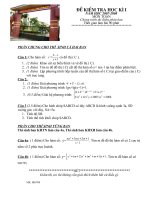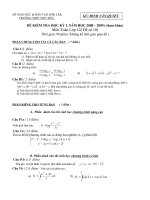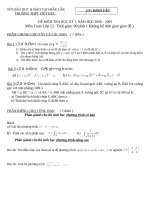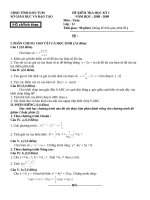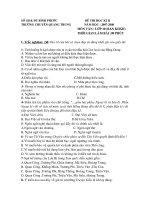ĐỀ KIỂM TRA HỌC KỲ 2 LỚP 12 NÂNG CAO pptx
Bạn đang xem bản rút gọn của tài liệu. Xem và tải ngay bản đầy đủ của tài liệu tại đây (64.52 KB, 3 trang )
ĐỀ KIỂM TRA HỌC KỲ 2
LỚP 12 NÂNG CAO
I. Choose the word whose underlined part is pronounced differently from the others.
1. A. threat B. breath C. death D. heat
2. A. advance B. endanger C. habitat D. animal
3. A. desert B. method C. decline D. temporary
4. A. canal B. illegal C. local D. global
5. A. gossip B. associate C. impression D. processor
II. Choose the word whose main stress is different from the others.
6. A. retain B. canal C. detail D. recruit
7. A. measure B. technique C. aware D. affect
8. A. sacrifice B. delicate C. technical D. continue
9. A. profitable B. associate C. temporary D. perilously
10. A. elaborate B. diversity C. relatively D. equivalent
III. Choose the word or phrase that best fits the blank space in each sentence.
11. Because of the extreme heat in deserts, animals hide out under rocks or burrows all day, ____ people
do not often see them
A. however B. therefore C. so D. but
12. They each _________ responsible for what they have done.
A. was B. are C. is D. is being
13. Be sure to ________ the bed as soon as you get up.
A. do B. make C. get C. set
14. In cold deserts, very few plants and animals can survive. _______ only a few people live there, they are
mostly scientists.
A. But B. Therefore C. Although D. Because
15. The use of computers aids in teaching, _________ the role of teachers is still very important.
A. yet B. unless C. despite D. however
16. Today, all five species of rhinos are perilously _______ to extinction.
A. near B. next C. close D. coming
17. There are some ___________ carried out to rescue rhinos from extinction.
A. ways B. methods C. measures D. purposes
18. In Africa, rhinos live in some of the same national parks and reserves that provide __________ for
elephants
A. environment B. habitat C. neighborhood D. condition
19. Her boyfriend lies to her, __________ she still loves and trusts him.
A. but B. however C. therefore D. so
20. They have lived next door to us for years, _________ we hardly ever see them.
A. so B. yet C. however D. because
21. Nowadays, many laws have been _________ to protect rare animals.
A. agreed B. written C. passed D. carried out
22. The life ______ of a tortoise is about 200 years.
A. time B. period C. span D. pace
23. We have plenty of time. We __________ leave yet.
A. needn’t B. don’t need to C. don’t have to D. all are correct
24. _______________________ the goalkeeper, we would have lost the match.
A. Without B. Unless C. If it weren’t D. Had it not been for
25. _______ big profits, poachers never want stop hooting rhinos to sell their parts and associated products.
A. Thanks to B. Because C. Apart from D. Without
IV. Choose the underlined word or phrase (A,B, C or D) that needs correcting.
26. You have to go to school on Sundays from now to the end of the school year, haven’t you ?
A B C D
27. It costs about sixty dollars to have a tooth to be filled in the United States.
A B C D
28. Neither of his parents were satisfied with his results when he was at high school.
A B C D
29. It took me a long time to get used to wear glasses when my eyes got worse several years ago.
A B C D
30. He can hardly remember anything about the accident because he was only a fours-year-old boy
A B C
when it happened.
D
VI. Read the passage carefully, then answer the questions that follow.
The deserts of the world are not all covered with sand. Many of them have surfaces of rock or clay or
small stones. They are not flat, either, they often have high hills and deep valleys. There is some plant life in
many parts of the desert. There is little rain in the desert, but it does fall often enough for most plants.
The deserts of the world are not uninhabited. People also live outside of the oases, but these people are
not farmers. They have camels, goats, donkeys, sheep etc. These animals can live on desert plants and do not
need much water.
The people of the deserts have to move constantly from place to place, they must always look for grass or
desert plants for their animals. They usually live in tents. When there is no more food for their animals, they
fold up their tents, put them on their camels and donkeys, and move to another place. In good years, when
there is enough food for their animals, they trade their skins and their goat and camel hair with people of
oases for wheat and fruit. But in bad years, when there is not enough food for their animals, the people of the
desert would attack the oases people. But they are also hospitable. No man in the desert would ever refuse to
give a stranger food and water.
31. According to the passage, deserts are mostly made of
A. small stones B. clay C. sand D. rock
32. In the desert________________
A. it rains in spring only. B. there is some rain, but far from enough.
C. it rains for a short time every month. D. the rainfall is just enough for the plants.
33. People live __________________
A. only in the oases. B. only outside the desert.
C. both inside and outside the oases. D. in places with regular rainfall.
34. From the passage, we know that life
A. is happy in the deserts B. is impossible in deserts
C. is hard in deserts D. in deserts is much better now
35. The word “hospitable” in the last paragraph is closest in meaning to
A. polite B. unfriendly C. kind D. mean
VII. Choose the sentence that is almost the same in meaning as the sentence given.
36. I read two books, but I didn’t find them interesting.
A. None of the two books I read was interesting
B. Either of the books I read weren’t interesting.
C. Neither of the books I read was interesting.
D. The two books I read wasn’t interesting.
37. He spent all his money. He even borrowed some from me.
A. As soon as he borrowed some money from me, he spent it all.
B. Hardly had he borrowed some money from me when he spent it all.
C. Not only did he spent all his money but also he borrowed some from me.
D. Not only did he spend all his money but he borrowed some from me as well.
38. The flat is very noisy, but we enjoy living here.
A. Noisy as the flat is, we enjoy living here.
B. Whatever noisy the flat is, we enjoy living here.
C. Although the flat is noisy, but we like the life here.
D. We enjoy living here but the flat is too noisy for us to live in.
39. Everyone expected her to win the tournament, but she didn’t.
A. Unlike everyone expected, she didn’t win the tournament
B. Everyone was unexpected when she won the tournament.
C. Contrary to everyone’s expectation, she lost the tournament.
D. To everyone’s expectation, she won the tournament.
40. I won’t sell the painting, no matter how much you offer me.
A. However money you have, you can’t buy the painting.
B. Although you offer me a lot of money, but I won’t sell the painting.
C. In spite of your offer, but I decide to keep the painting.
D. Whatever price you offer me, I won’t sell the painting
V. Choose the word or phrase that best fits in the blank space in the passage.
The (41) _______of animal species that have died out since 1600 (42) _________ sharply. Experts have
(43) __________ historical evidence of extinction. As far as they can tell, (44) _______ the beginning of
modern historical records and the beginning of the 17
th
century, fewer than twenty species of animals died
out. (45) _________, in just one century, from 1600 to 1699, seventeen more animal species were known
(46) ______________. The next century saw the extinction of thirty-six species. And the rate (47) _______
increasing. In the 1800, eighty-one (48) _______ species died out. In the first three quarters of the twenty
century, sixty-three species disappeared, (49) _________ the education of people (50) _____ endangered
species. The rate of extinction has not been slowed by public information.
41. A. amount B. number C. figure D. total
42. A. increase B. increased C. has increased D. have increased
43. A. cared for B. looked for C. concerned D. noticed
44. A. from B. at C. in D. between
45. A. Although B. However C. Because D. So
46. A. to disappear B. to be disappeared C. to have disappeared D. being disappeared
47. A. kept B. enjoyed C. went D. remained
48. A. many B. more C. much D. other
49. A. though B. despite C. when D. since
50. A. of B. at C. about D. in

